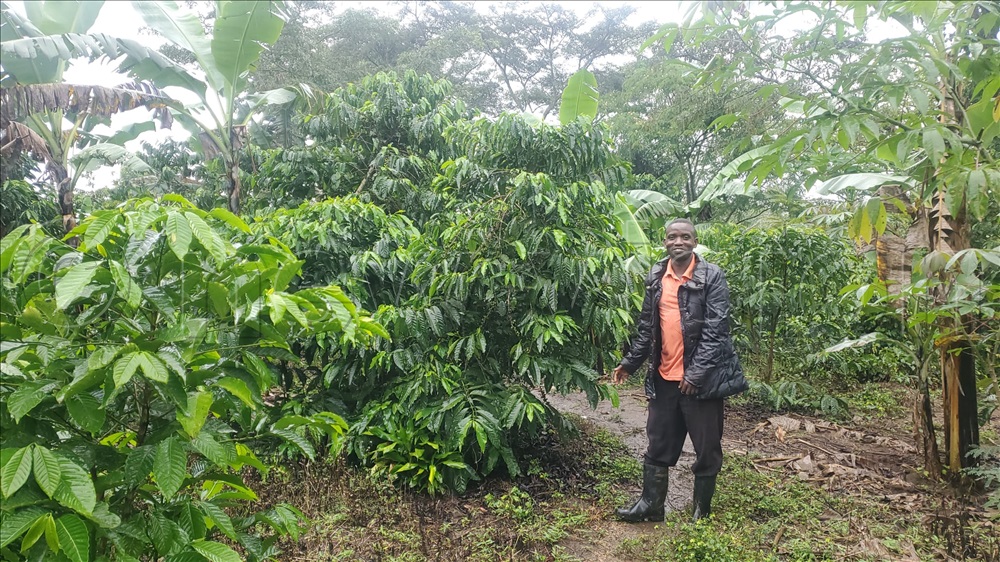By Aloysious Kasoma
Coffee farmers in Sekanyonyi, Mityana district have made significant strides in replacing artificial pesticides and fertilizers with homemade organic alternatives.
A group of young farmers has embraced this transition, alongside diversifying their income sources through additional activities like producing exercise books and growing herbs and spices. This initiative is supported by certified trainers in small business startups.
Monica Nantume, a resident of Gombe Village, realized in late 2021 that coffee farming was causing her losses. Despite investing between sh100,000 and sh200,000 in artificial pesticides and fertilizers, her half-acre coffee plantation yielded less than 100 kilograms per season.
“The prices of fertilizers and pesticides which could do nothing for me were the major source of cries I used to regret why I am even in this farming. Coffee was a problem to me,” she added.

The high cost of these inputs demoralized her and even led her husband to abandon the venture, as they struggled to fund their children’s education.
“I was highly demoralised because I was investing in too much as compared to what I get, the energy, my husband was the first to shun the then loss-making venture because our children could even be chased out of school when all the little money we had, had been invested here,” she said.
This problem extended to other coffee farmers, particularly among the youth. Francis Sserugo, the chairperson of the Tukolele Wamu Gombe Group, was also spending a significant amount on pesticides and fertilizers, often selling his coffee prematurely to cover these expenses and school fees for his children.
“Sometimes due to lack of funds I could sell off part of my coffee while it is still young at a cheap price just to get money for getting the fertilizers and pesticides and pay school fees for my children,” he said.
Around 15 young coffee farmers faced the same challenge of expensive artificial fertilizers and pesticides until they received training from two NGOs, Sawa World and Lavazza Foundation, as part of the Ujana coffee project.
“Fortunately, all of us who attended the training mastered the entire process and as I speak now we are doing fine, we are now making extra fertilizers and pesticides which we are selling to other coffee farmers,” he added.
Close to 60 youths from Sekanyonyi were among the 385 beneficiaries of the second phase of this project, which aimed to empower young coffee farmers with various skills, including making organic fertilizers and pesticides.
Sawa World and Lavazza Foundation addressed the specific challenges faced by these young farmers, providing training on creating organic fertilizers and pesticides, making books, producing shoes, and growing spices. In total, 765 youths were trained, and they, in turn, have trained 4,394 of their peers in their communities.
The project, which runs from November 2019 to April 2025, aims to impact 10,000 youths directly and indirectly.
These businesses require minimal startup capital, starting at less than $50, with the potential to generate a monthly income of $27 to $31, translating to an annual income of $339 (Shs1.2m) for a youth coffee farmer.
Francis Sserugo and his fellow young coffee farmers were particularly interested in learning how to make organic fertilizers and pesticides because these were their main obstacles.
Fortunately, they mastered the process and now produce these organic inputs for their own use and sale to other coffee farmers.
The process involves using ingredients such as human or rabbit urine, garlic, chili, eggshells, onions, ashes, charcoal husks, bean leaves, and Enanda (wandering jaw).
Urine provides nitrogen, onion acts as a preservative, bean leaves and wandering jaw provide an organic element, charcoal husks and ash contain potassium, eggshells provide calcium, garlic helps preserve the output and deter pests, and chili acts as a natural pesticide. Human urine is stored for a month to remove artificial chemicals before use.
To make the organic pesticides, a mixture of urine, ash, charcoal husks, garlic, onion, wandering jaw, and eggshells is prepared and left to ferment for a week.
The output is then filtered to obtain the pesticide, while the residue can be used to treat sick plants and banana trees. The pesticide is diluted with water before spraying, and for an acre of land, 15 to 20 jerry cans of the mixture are needed.
This shift to homemade organic fertilizers and pesticides has led to increased coffee yields and reduced expenses.
For instance, Monica Nantume, who used to harvest 100 kilograms from her half-acre coffee garden, now produces between 250kg and 350kg of dried coffee. Similarly, other young farmers have experienced significant improvements in their coffee yields without a substantial investment in pesticides.
Apart from producing organic inputs for coffee farming, these youths have also learned to make books and shoes, leading to the establishment of micro-businesses.
This additional income source has helped them manage their expenses and generate a more stable income, especially during the off-season for coffee.
The partnership between Sawa World, Lavazza Foundation, and the young coffee farmers has been instrumental in promoting sustainable agriculture practices and empowering the youth to achieve financial independence through diversified income sources.





